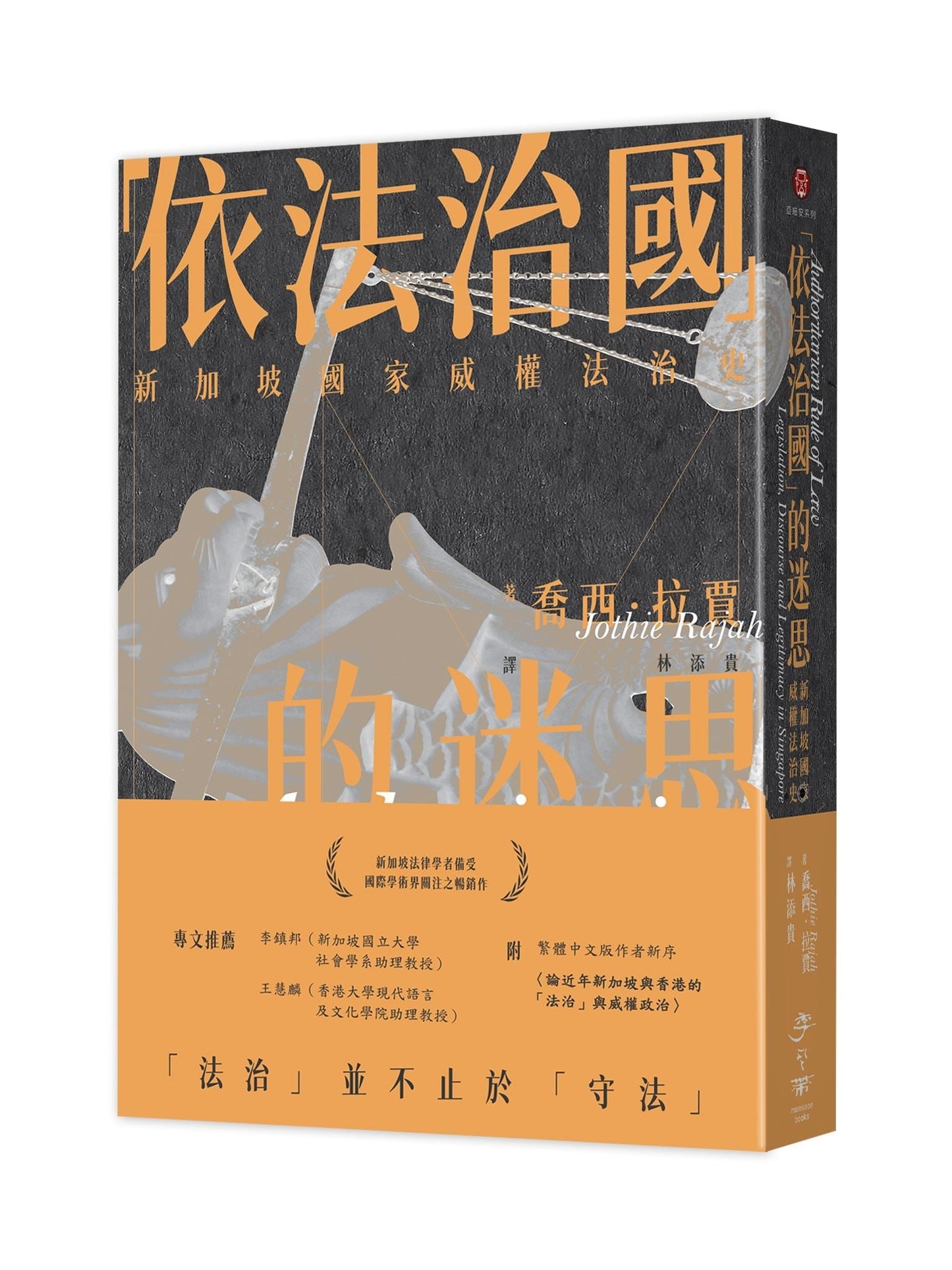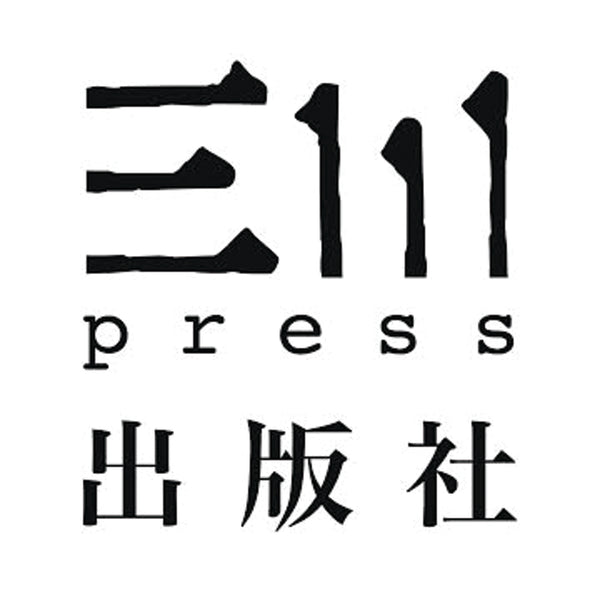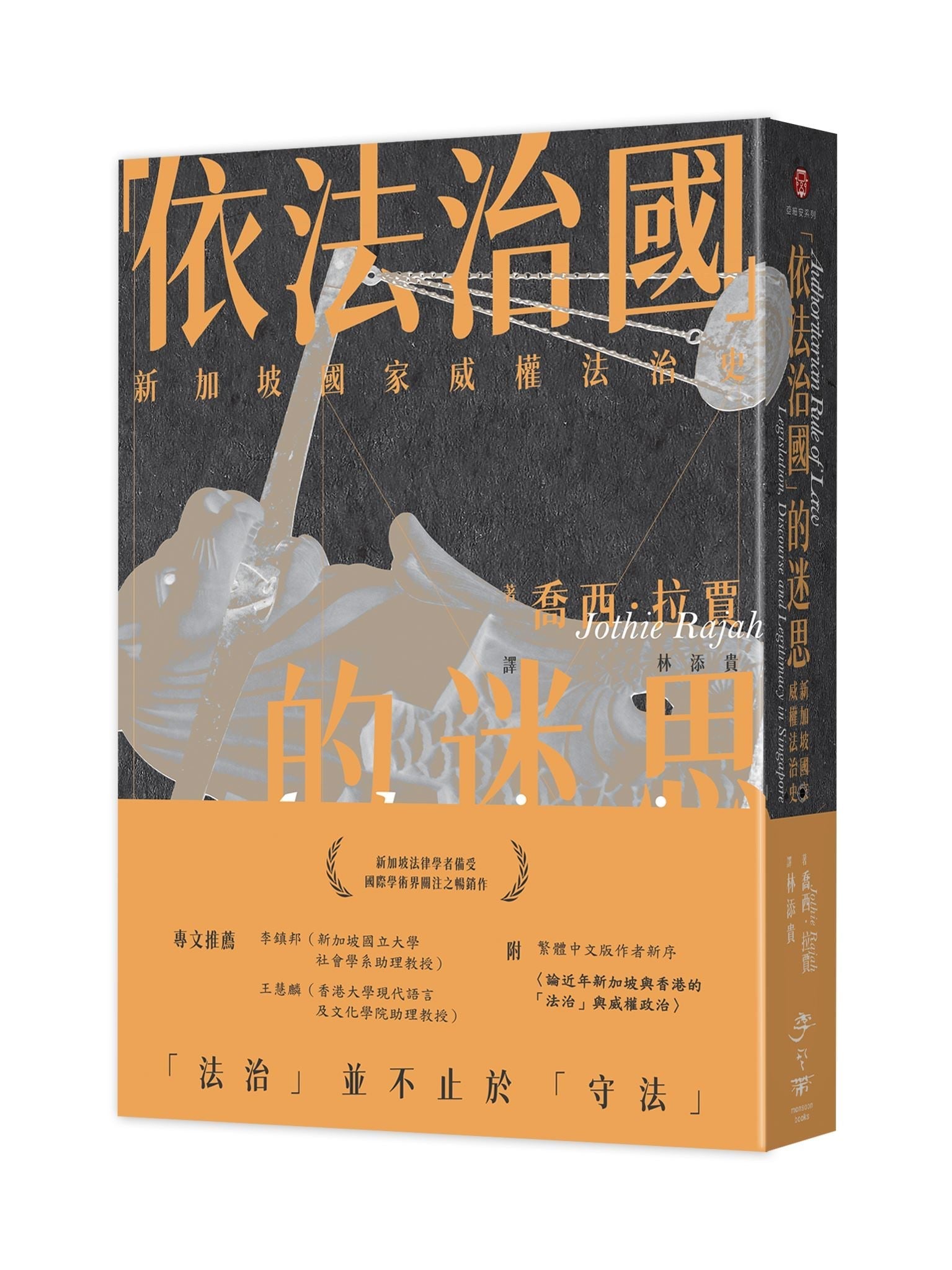The Myth of “Rule of Law”: Singapore’s History of Authoritarian Rule of Law
The Myth of “Rule of Law”: Singapore’s History of Authoritarian Rule of Law
5 in stock
Couldn't load pickup availability
出版社: 季风带
ISBN/EAN: 9789860611113
出版日期: 2021-04-30
页数: 488页
语言: Traditional Chinese
● A best-selling work by a Singaporean legal scholar that has attracted much attention from the international academic community.
● Recommended by Lee Chin Pong (Assistant Professor, Department of Sociology, National University of Singapore) and Wang Huilin (Assistant Professor, School of Modern Languages and Cultures, University of Hong Kong) ● Appendix: New Preface to the Traditional Chinese Edition, "On the Rule of Law and Authoritarian Politics in Singapore and Hong Kong in Recent Years"
● “Rule of law” is more than just “obeying the law”.
"Rule of law" has become a commonplace phrase for authoritarian governments. Singaporean legal scholar Jothie Rajah, in his book "The Myth of 'Rule of Law': A History of Authoritarian Rule of Law in Singapore," argues that the definition of "rule of law" and how laws are enacted, interpreted, and enforced are ultimately defined and governed by a particular political philosophy and even a model of governance. These are political products, deeply intertwined with the lives of all people.
The author argues that Singapore's authoritarian model of "rule of law" merits study: how it leverages its colonial legal legacy to cultivate a public image as a nation steeped in Western political and cultural heritage, while simultaneously constructing an authoritarian regime under the guise of "rule of law," fostering a narrative of national development characterized by inherent tension. Citing the renowned French political scientist Michel Foucault's theory of governmentality, the author further illustrates how the concept of "rule of law" is used in Singapore to justify authoritarianism, how political order, and even common sense, is thereby constructed, and how it shapes the lives of the people.
For this reason, the author invites readers to reflect on the relationship between the "rule of law" itself and the spirit of freedom, how the concept of "rule of law" has been tailored and grafted onto authoritarianism, and how the public can construct an alternative political order. From the author's perspective, simply "obeying the law" is not enough to explain the meaning of "rule of law."
● “The author’s legal and family background greatly enhances the credibility of the book’s content and the richness of its information, giving this book, which is widely regarded as a criticism of Singapore’s rule of law, solid evidence and arguments… The book discusses five famous Singaporean laws, including the Vandalism Act of 1966, the Press Act of 1974, the Legal Profession Act of 1986, the Religious Harmony Act of 1986, and the Public Order Act of 2009. Through detailed historical analysis, the author meticulously explains the legislative process of the five bills and examines the social background of the legislation. In order to illustrate how the rule of law becomes rule by law, that is, the law serves political purposes.” - Li Zhenbang (Assistant Professor, Department of Sociology, National University of Singapore)
● “The author not only examines the current state of the rule of law in Singapore from multiple perspectives, but also uses Foucault’s theory of ‘Governmentality’ to explain how law, as a tool, forms part of the Singapore government’s surveillance power, controlling society as a whole… I sincerely recommend that you read this book carefully and ponder the discussions within. Comparing this book with the current state of the rule of law in Asian societies will yield different insights.” —Wang Huilin (Assistant Professor, School of Modern Languages and Cultures, University of Hong Kong)
● “Law and politics are inextricably linked, which is actually the main point of Singaporean legal scholar Jothie Rajah’s book “The Myth of ‘Rule of Law’: A History of Authoritarian Rule of Law in Singapore.” The original title of the book is Authoritarian Rule of Law: Legislation, Discourse and Legitimacy in Singapore, published by Cambridge University Press in the UK. The author Rajah is Singaporean and also the ex-wife of Singapore’s Minister of Home Affairs, K. Shanmugam. The main purpose of her writing “The Myth of ‘Rule of Law’” is to analyze how “rule of law” can become a tool to consolidate authoritarian politics. Rajah specially wrote a long new preface for the Traditional Chinese version of “The Myth of ‘Rule of Law’”, deconstructing the authoritarian politics and ideology behind Singapore’s “Anti-Online False Information and Manipulation Act” and Hong Kong’s “Hong Kong National Security Law”.” - Kwong Kin Ming (author of “Two Cities Confronted: The Singapore Model and the Future of Hong Kong”)
Jothie Rajah
Raja is currently a research professor at the American Bar Foundation. His new book , Discounting Life: Law, Culture, and the Long War on Terror, will be published by Cambridge University Press. His research focuses on the relationship between law, discourse, and power. In 2012, he published Authoritarian Rule of Law: Legislation, Discourse and Legitimacy in Singapore, the original English version of which is available on the website. His papers have appeared in various academic journals. Raja received his doctorate in law from the University of Melbourne, Australia, where he received numerous research awards. Prior to that, he graduated from the Faculty of Law at the National University of Singapore, where he also taught.
Lin Tiangui
A graduate of National Taiwan University, he has served as a senior corporate executive and a senior news media editor. He has translated over 100 books, including "Singapore's Unconventional Rise," "Has China Won?: Challenging America's Powerful Leadership," "Ask Lee Kuan Yew: A Prime Minister's Reflections on China, the United States, and the World," "The South China Sea: Asia's Powder Keg in the 21st Century and China's First Step to Hegemony," "The Chinese Dream: From Deng Xiaoping to Xi Jinping," "China's Asian Dream: A Comprehensive Interpretation of the Belt and Road Initiative: What Threats and Challenges Will It Bring to Taiwan and the World," "A Biography of Chiang Ching-kuo," "Chiang Kai-shek and the Struggle for Modern China," "A New Biography of Soong May-ling: The Magnificent Lady," "Mao Zedong: The True Story," "Kissinger's Diplomacy" (co-translation), "The Grand Chessboard: Global Strategic Thinking," "Yalta: The Eight-Day Secret Meeting That Changed the Destiny of the World," and "The 2049 Marathon: China's Secret Strategy for Global Domination."
Email: georgelin8866@gmail.com
9 Author's original preface "The Myth of "Rule of Law"" Writing Origin ⊙ Joshi Raja
13 Traditional Chinese Edition Author's New Preface On the "Rule of Law" and Authoritarian Politics in Singapore and Hong Kong in Recent Years ⊙ Joshi Raja
41 Recommended Preface (I) “The State Must Protect Society” — On State Construction and “Rule of Law”
Li Zhenbang (Assistant Professor, Department of Sociology, National University of Singapore)
49 Recommendation Preface (II) The Deformation and Distortion of the British Rule of Law ⊙ Wang Huilin (Assistant Professor, School of Modern Languages and Cultures, University of Hong Kong)
53 Introduction to “Rule of Law” and Authoritarian Politics: Deconstructing Judicial Politics from a Historical and Comparative Perspective ⊙ Kuang Jianming (Editor-in-Chief of Monsoon Culture)
64 Concept map of the book "The Myth of "Rule of Law": A History of Authoritarian Rule of Law in Singapore"
67 Chapter 1 Law, Illiberalism, and the Singapore Case
71 1.1 Why is the Singapore case worthy of attention?
72 1.2 The Legitimacy of Authoritarianism
76 1.3 Case Studies of Laws That Silence People
80 1.4 From Backwater to Metropolis: Prosperity, “Race” and “Law”
87 1.5 Anxiety Hidden Beneath the Surface
89 1.6 Managing Differences through “Law”
93 1.7 Different Forms of “Rule of Law”
97 1.8 “Law” and the Dual State
99 1.9 “Law”, Political Liberalism, and the Neutral State
103 1.10 Liberalism is suppressed and “rule of law” is adopted
107 Chapter 2 Discussion of Law
111 2.1 Critical Discourse Analysis
113 2.2 Political Views of the Ko School
119 Chapter 3 Corporal Punishment to Protect the Nation - The Vandalism Act of 1966
123 3.1 The political context of 1966
125 3.2 “Aid Vietnam” Movement
128 3.3 Killing the Chicken to Frighten the Monkey and Fragile States
135 3.4 Case Law on Vandalism
139 3.5 Hong Jinshan Case
142 3.6 Vandalism and Caning in the Post-Cold War World
144 3.7 Public discussion on “vandalism” in 1994
150 3.8 Reflection on the Judgment
152 3.9 Joint trial: Police abuse of power
155 3.10 East and West: Social Order and Punishment
163 3.11 Courts under Nationalism
165 3.12 Panopticon and the “State”
169 Chapter 4 "Anti-State" - Regarding the Publication Law
172 4.1 The Importance of the Publishing Law
178 4.2 Lee Kuan Yew's speech in Helsinki
187 4.3 Lee Kuan Yew’s Theory of “State”
190 4.4 About the Special Committee
193 4.5 The 1974 Publication Law - Governance and Ideology
195 4.6 Publishing Law after 1974
197 4.7 Foreign publications as a source of new crises
200 4.8 Tamed Singaporeans
203 4.9 The Internet and Public Discourse
207 Chapter 5: Surveillance of Lawyers and Undermining of Citizens’ Rights - The Legal Profession Act 1986 (Amendment)
211 5.1 Lawyers in trouble
212 5.2 The Silenced Lawyer
215 5.3 The situation of lawyers representing detainees
223 5.4 Response from State Organs
224 5.5 Select Committee Hearings: Trials and State Authority
226 5.6 Lee Kuan Yew's role
233 5.7 Associational Activities and Individual Prisoners
242 5.8 Debate in the public sphere
247 5.9 Neocolonialism in the Postcolonial Era
249 5.10 Silencing Model: Arrest without Trial
254 5.11 A Lost Moment for the Legal Profession
256 5.12 History Repeats Itself
258 5.13 Lawyers’ Limited Space for Action
263 Chapter VI: Surveillance of Religion - "Maintaining Religious Harmony Law"
266 6.1 Discourse and Law
270 6.2 Authority to Determine Intention
271 6.3 Marxist Conspiracy: The Hidden Danger in the Eyes of the State
276 6.4 Activism of “Class” and the “Marxist Conspiracy”
279 6.5 Is religion a new form of communism?
283 6.6 Injunction: Developing the State’s Understanding of “Religion”
285 6.7 Limitations of injunctions
286 6.8 Performance of “Law”
290 6.9 Empty Show? Presidential Council for Religious Harmony
293 6.10 Laws that have not been used
296 6.11 Legislative, Policy, and Regulatory Statements
299 Chapter 7: Further Suppression of Liberalism - Public Order Act 2009
302 7.1 “State” and Mega-Events
304 7.2 Strengthening public order
309 Chapter 8 Conclusion - Legislation, Illiberalism, and Legitimacy
312 8.1 International Bar Association Human Rights Research Centre and the Singapore Government
315 8.2 Laws to promote development
318 8.3 Contradictions in the Postcolonial Era
319 8.4 The Legitimacy of “British Law”
321 8.5 Continuously Colonized Citizens
322 8.6 The Legitimacy of “Governance by Law”
323 8.7 Extending exceptionalism through legislation
324 8.8 Legitimizing exceptionalism through national narratives
324 8.9 The value of colonial precedents
327 8.10 “Governance by Law” and Power
329 8.11 Governmentality, Legal Exceptionalism, and Elections
332 8.12 Governance, National Narratives, and the Precarious State
334 8.13 Public Opinion Leaders, Alliances, and Transcendence
336 8.14 Conclusion
341 Acknowledgements
348 comments
446 References
Share


